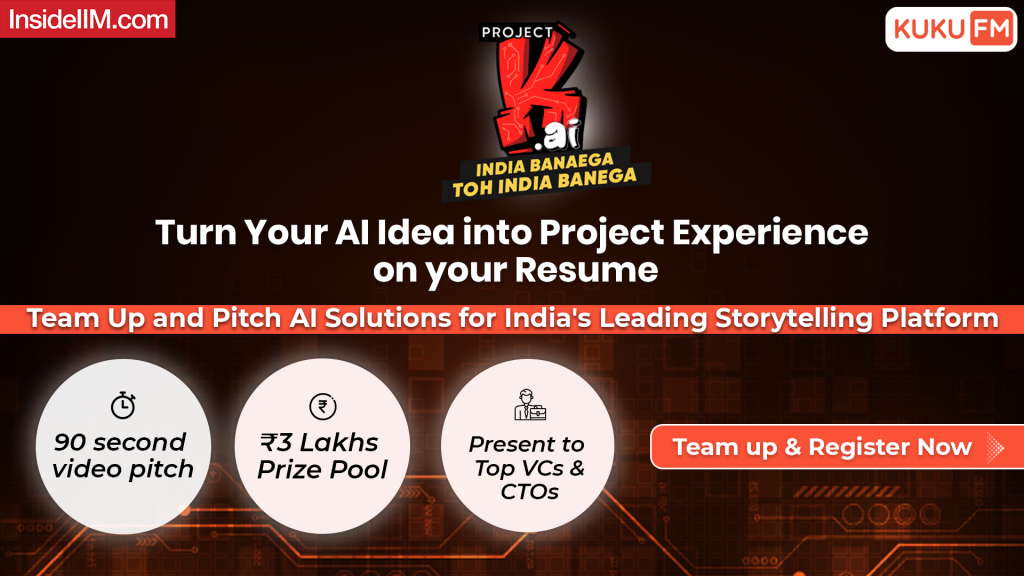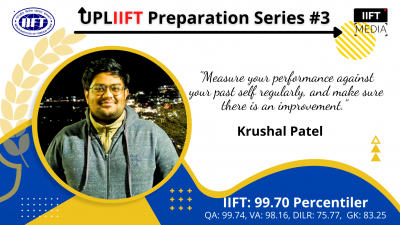In today’s interview, we have
Krushal Patel from the Batch of 2021-23, who scored 99.70 percentile in IIFT entrance exam and he would be sharing some key pointers from his preparation that helped him score well. A
snapshot of his profile and scores: Educational Background: B.E. Electronics and Communications Engineering (BITS, Pilani) || Work Experience: 13 months ||
IIFT: Overall- 99.70, QA- 99.74, LRDI- 75.77, VARC- 98.16, GK- 83.25.
 The UPL’IIFT’ Series- spearheaded by the Media Committee, Indian Institute of Foreign Trade, in collaboration with InsideIIM is an initiative to help aspirants understand and prepare for the IIFT Entrance Exam with strategies exercised by some of the top performers.
The UPL’IIFT’ Series- spearheaded by the Media Committee, Indian Institute of Foreign Trade, in collaboration with InsideIIM is an initiative to help aspirants understand and prepare for the IIFT Entrance Exam with strategies exercised by some of the top performers.
Tell us about your journey. What is your background and how did you decide to do an MBA?
Back in school I always knew I was going to be pursuing engineering because it seemed like the best option for me at the time. I eventually enrolled in BITS Pilani, and chose to study Electrical and Electronics engineering, because I was really not interested in coding. But during my years there I eventually realized that engineering was not my passion, so I started to explore other avenues. I did a bit of finance and analytics, and finally landed an internship role in Lowe’s India - I was a part of the digital analytics team. It was a six-month internship and I was fortunate enough to be offered a PPO at the end of it. I worked there for the next 13 months and realized that I enjoyed the work there, but I wanted to do something more with my life. During my tenure there, I had the opportunity to lead some teams and I was drawn to the managerial side of things. This interest accentuated and about 10 months into my time there, I decided to go for an MBA and discussed this decision with my parents and colleagues - all of whom encouraged me to go for it. So, I resigned and gave myself a six-month window to prepare for the entrance exams, along with CFA level 1.

When did you start your preparation for the IIFT exam and can you walk us through your preparation strategy?
It was completely self-study. MBA entrance tests focus on your aptitude mostly and as such there is no syllabus that needs to be learned. Most of us have been through coaching in high school already so I feel this preparation is mostly about getting back in the rhythm. The most important aspect of my preparation was time management. There are always trap questions in these papers and if you’re not able to identify them and move on quickly, then there are high chances you’ve ruined your paper. It’s important to structure your approach and make sure you solve all the easy questions at least. I signed up for the test series of Career Launcher, however, students can also opt for TIME and IMS because of the large base of test givers and how it gives a more accurate percentile. From the beginning, my target was to score full marks. It is an impossible target, but my approach was to gradually improve my weaknesses. Hence, I would advise students to solve as many questions as possible and time yourself. English was my strongest section and DILR was the weakest. For a lot of us who prepared for JEE and other entrance exams, we quickly realize it’s difficult to bring back the same amount of focus as we developed back during school. Again, the important thing is to keep solving questions and gradually reduce the time taken to solve them.
How did you measure the progress in your preparation and how did you analyze the same?
For me, the way of measuring the progress in my preparation was through the mocks itself. You can have mastered topics but while giving the test, the pressure is much higher. These mock tests helped me learn to solve under a timer and handle the pressure. During the initial days of my preparation, I gave a mock test to set a benchmark for my preparation, and for every subsequent test, I gave myself a goal of improvement of a certain percentage point in the score. Moreover, with every test, it is important to analyze the results for your weakness as well as questions on which you spent the most time. Continuously working upon these points really helped me attain the goal of improvement which I set for myself.
I also tried multiple strategies during the mocks to make myself more comfortable in different situations. Initially, I always started with my strength which was the verbal ability section. I had noticed early on that if I wasn’t able to start strong, I couldn’t reset myself quickly and the other sections also suffered. Another approach that I learned was to complete the paper in multiple rounds. I analyzed which topics gave me trouble and the moment I saw a question from these topics, I would immediately skip it without wasting any time on it. My priority was to solve all the easy questions first and then revisit the difficult ones. The goal was to build momentum and this strategy also helped me during the actual exam.
As for the number of mocks, I gave ~30 mocks in total, including the complete test series of Career Launcher. Continuously practicing the questions, working upon the weaknesses, and then taking the test again built up a cycle that really helped me improve my performance.
How did you deal with the pressure during your preparation?
It is true that the preparation phase is a long and arduous journey. The journey was a bit more difficult as I did my preparation during the pandemic like almost all of the students now. My advice to the aspirants would be to keep an open line of communication with their family and friends. It also helped me to have study mates who were preparing along with me with whom I could share my thoughts even though I wasn’t meeting them in person. It is important to understand that you are not alone in this journey and that really helps to deal with the pressure.
What factors did you have in mind while applying for different B schools and why did you choose IIFT?
I had already decided not to choose a specialization before joining, as some B schools did offer that choice. I had gone down that path during my bachelors and it did not work out for me and so what was important for me was to get into a top B school. I believe that in an MBA, most of the learning happens outside the classroom, that is peer learning. Therefore, I wanted to be amongst the best minds of the country. IIFT has a long legacy, a heritage - because of which its learning has been optimized and there is a history of success. Of course, placements also played a part and IIFT has a stellar placement record. Personally also, since the world is growing increasingly global, I wanted to capitalize on IIFT as one of the best trade schools in the country. I was also interested in the international collaboration IIFT had with B schools abroad, and the prospect of studying a semester abroad.
Do you have any final tips for aspirants?
I feel the key to cracking these tests is all in the mind. I follow Novak Djokovic and one of his quotes has stayed with me which mentioned that anyone in the top 100 rankings can win a grand slam and it comes down to the mental game which decides who wins it. I believe it is the same for the examination as well. The questions are not very difficult and if we could solve them at home, most of us would be able to answer most of them correctly. Practice enough so that you don’t get stage fear during the actual exam. Get comfortable solving questions. It is not about who is the smartest but who can answer the most questions in the limited time while managing the stress.




